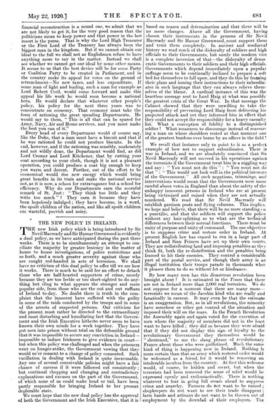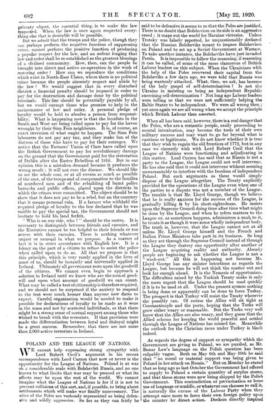THE NEW POLICY IN IRELAND. T HE new Irish policy which
is being introduced by Sir Nevil Macready and Sir Hamar Greenwood is evidently a dual policy, as we have anticipated during the past three weeks. There is to be simultaneously an attempt to con- ciliate the majority by greater leniency in the matter of house to house investigations, of police restrictions and so forth, and a much greater severity against those who are caught red-handed in acts of terrorism. We shall have no criticism of this dual policy to offer till we see how it works. There is much to be said for an effort to detach those who are half-hearted supporters of crime, merely because they are too feeble or too short-sighted to do any- thing but cling to what appears the stronger and more popular side, from those who are the out and out ruffians of Ireland to-day. No doubt there is truth in the com- plaint that the innocent have suffered with the guilty in some of the raids conducted by the troops and in some of the arrests of suspected persons. Our criticism for the present must rather be directed to the extraordinary and most disturbing and humiliating fact that the Govern- ment and the Irish Executive hitherto never seem to have known their own minds for a week together. They have put men into prison without trial on the defensible ground that•it was impossible to secure any conviction in Ireland— impossible to induce Irishmen to give evidence in court— but when this policy was challenged and when the prisoners went on hunger-strike, the Government vowing that they would ne'er consent to a change of policy consented. Such vacillation in dealing with Ireland is quite inexcusable. Any one of several conceivable policies might have a fair chance of success if it were followed out consistently ; but continual chopping and changing and contradictory explanations and excuses on the part of the Government, of which none of us could make head or tail, have been partly responsible for bringing Ireland to her present deplorable state. We must hope that the new dual policy has the approval of both the Government and the Irish Executive, that it is based on reason and determination and that there will be no more changes. Above all the Government, having chosen their instruments in the persons of Sir Nevil Macready and Sir Hamar Greenwood, must support them and trust them completely. In ancient and medieval history we read much of the disloyalty of soldiers and high officials to their Governments, but surely the modern vice is a complete inversion of that—the disloyalty of demo- cratic Governments to their soldiers and their high officials. Governments which depend immediately upon a popular suffrage seem to be continually inclined to prepare a soft bed for themselves to fall upon, and they do this by framing their plans and issuing their instructions to their subordin- ates in such language that they can always relieve them- selves of the blame. A cardinal instance of this was the heartless message sent to Lord Haig at what was possibly the greatest crisis of the Great War. In that message the Cabinet showed that they were unwilling to take the responsibility of preventing Lord Haig from delivering his projected attack and yet they informed him in effect that they could not accept the responsibility for a heavy casualty list. What a conception of fidelity to a distinguished soldier ! What meanness to discourage instead of reassur- ing a man on whose shoulders rested at that moment one of the greatest burdens ever borne by an officer in the field !
We recall that instance only to point to it as a perfect example of how not to support subordinates. There is war in Ireland, and we are absolutely convinced that Sir Nevil Macready will not succeed in his operations against the terrorists if the Government treat him in a niggling way and say : " You must not do this " : " You must not de; that " : " This would not look well in the political interests of the Government." All such negations, trimmings, and interventions would mean that the Government were more careful about votes in England than about the safety of the unhappy innocent persons in Ireland who are at present being victimised and ruined when they are not actually murdered. We read that Sir Nevil Macready will establish garrison posts and flying columns. This implies, we hope and believe, that there will be no more standing cif a punctilio, and that the soldiers will support the police without any hair-splitting as to what are the technical differences between their normal functions. There must be unity of purpose and unity of command. The one objective is to suppress crime and restore order in Ireland. At present English law has ceased to run in a large part of Ireland and Sinn Feiners have set up their .own courts. They are redistributing land and imposing penalties as they think fit, both the re-distribution and the penalties being framed to hit their enemies.' They control a considerable part of the postal service, and though their army is an illegal institution their troops parade in thousands when it pleases them to do so without let or hindrance.
By how many men has this disastrous revolution been brought about ? It is estimated in the Times that there are not in Ireland more than 2,000 real terrorists. We do not suppose for a moment that there are many more-- terrorists we mean of the Jacobin kind who are really and fanatically in earnest. It may even be that the estimate is an exaggeration. But, as in all revolutions, the minority have somehow or other got control of the situation and imposed their will on the mass. In the French Revolution the Assembly again and again voted for the execution of men whom the majority of members did not in the least want to have killed ; they did so because they were afraid that if they did not display this sign of loyalty to the revolutionary Government they themselves would be " shortened," to use the slang phrase of revolutionary France about those who were guillotined. Much the same kind of thing is happening now in Ireland. Nothing is more certain than that an army which restored order would be welcomed as a friend, for it would be removing an intolerable incubus from the country. At first this welcome would, of course, be hidden and secret, but when the terrorists had been removed the sense of relief would be expressed openly and enthusiastically. There is nothing whatever to fear in going full steam ahead to suppress crime and anarchy. Farmers do not want to be ruined ; shopkeepers do not want to see their trade disappear ; farm hands and artisans do not want to be thrown out of employment by the downfall of their employers. The primary object, the essential thing, is to make the law respected. When the law is once again respected every- thing else that is desirable will be possible. But we admit that the troops and the police, though they can perhaps perform the negative function of suppressing crime, cannot perform the positive function of producing a popular respect for the law, and an ardent longing that law and order shall be re-established as the greatest blessings of a civilised community. How, then, can the people be brought into direct and active co-operation in the work of restoring order ? How can we reproduce the conditions which exist in North-East Ulster, where there is no political crime because the people sincerely respect and abide by the law ? We would suggest that in every disturbed district a financial penalty should be imposed in order to pay for the destruction and damage done by the political Criminals. This fine should be potentially payable by all, but we would exempt those who promise to help in the maintenance of law and order. A personal pledge of loyalty would be held to absolve a person from responsi- bility. What is happening now is that the loyalists in the South and West are being called upon to pay for the havoc wrought by their Sinn Fein neighbours. It is, of course, an exact inversion of what ought to happen. The Sinn Fein labourers do not pay any tax, and they make fun of the distress of those who have to pay for their outrages. We notice that the Varmexs" Union of Clare have called upon the British Government to pay for revolutionary damage on the ground that the Government paid for the restoration of Dublin after the Easter Rebellion of 1916. But in our opinion this is a mistaken demand because it produces the wrong result ; it will not cure the disease. We should like to see the whole cost, or at all events as much as possible of the cost, of the troops and of compensation to the families of murdered men and of the rebuilding of burnt police barracks and public offices, placed upon the districts in which the crimes were committed. The object should be to show that it does not pay to be a rebel, but on the contrary that it means personal ruin. If a farmer who withheld the required pledge of loyalty to the law declared that he was unable to pay the special tax, the Government should not hesitate to hold his land forfeit.
" Who is on our side, who ? " should be the motto. It is necessary to distinguish between friends and enemies, and the Executive cannot be too helpful to their friends or too severe with their enemies. There is nothing whatever unjust or unusual in what we propose. As a matter of fact it is in strict accordance with English law. It is a felony on the part of a citizen to refuse to assist the police when called upon to do so. All that we propose is that this principle, which is very rarely applied in the lives of most of us, should be instantly and universally applied in Irelanei. Ultimately all government rests upon the goodwill of the citizens. We cannot even begin to approach a solution in Ireland until we know who are the men of good- will and upon what amount of goodwill we can count. What may be called a test of citizenship is therefore required, and we should not be surprised if the anxiety to respond to the teat were much keener than anyone now dares to expect. Careful organisation would be needed to make it possible for declarations of loyalty to be made as it were in the mass and not by scattered individuals, so that there might be a strong sense of mutual support among those who Wished to break with the terrorists. If that provision were made the differentiation between loyal and disloyal might be a great success. Remember, that there are not more than 2,000 active terrorists in Ireland.



































 Previous page
Previous page